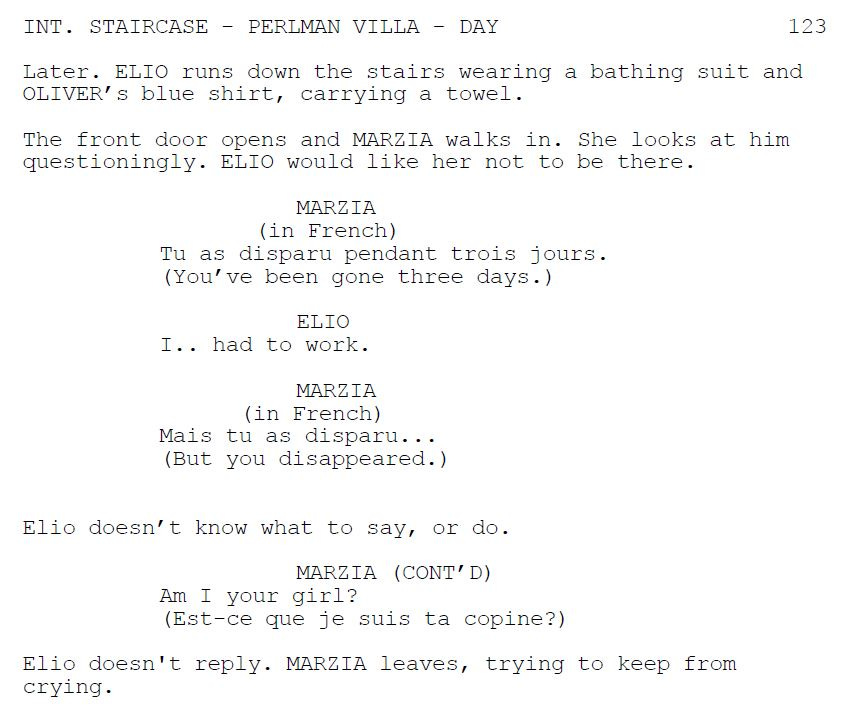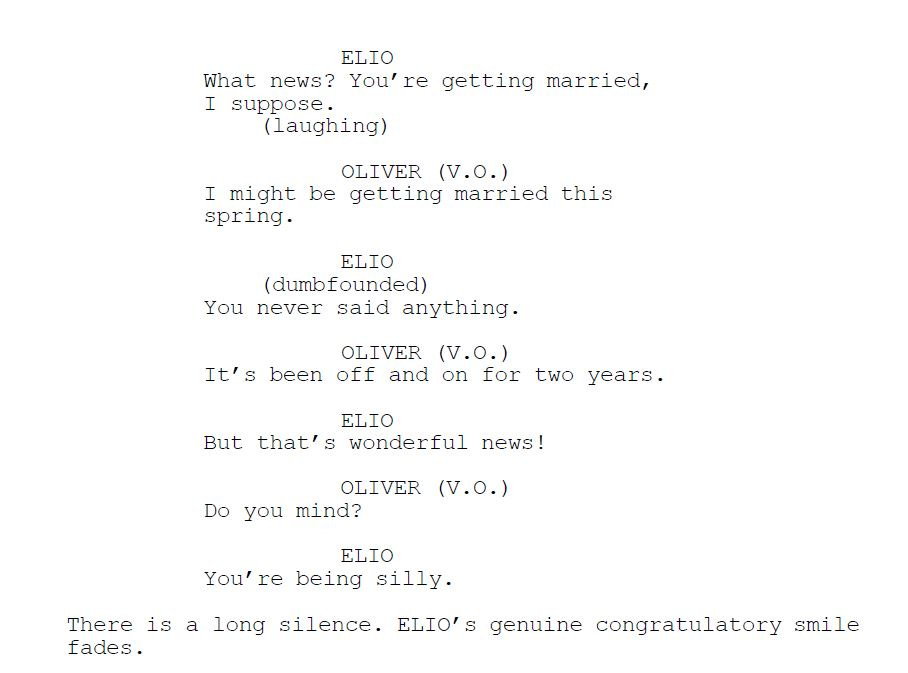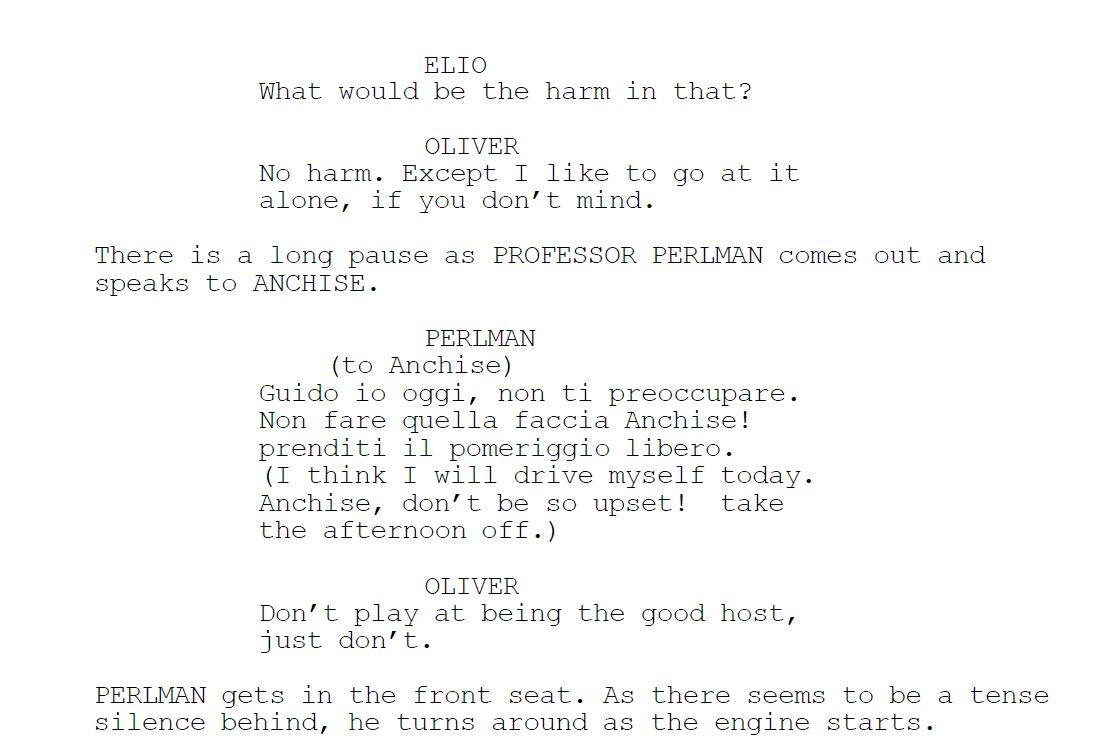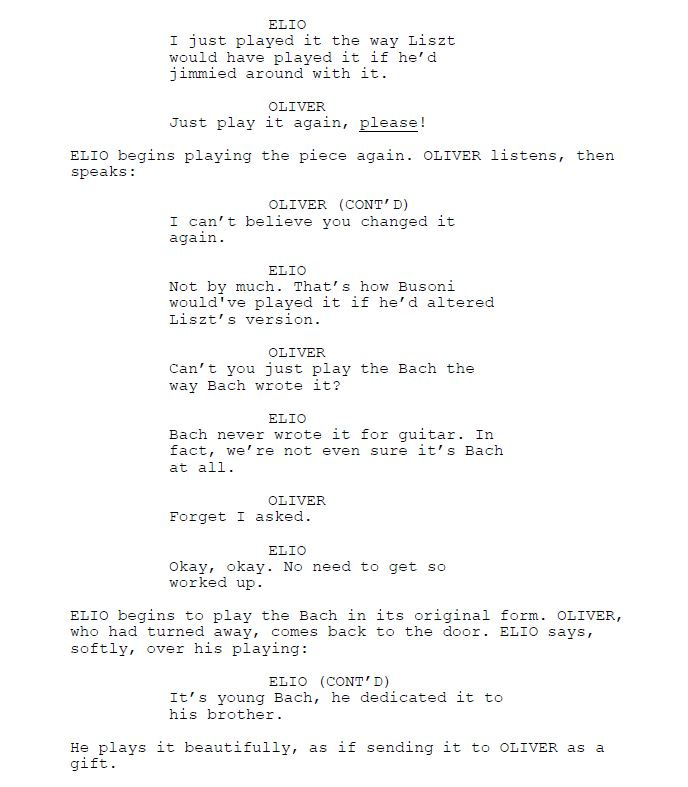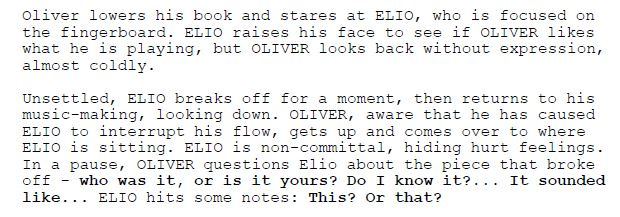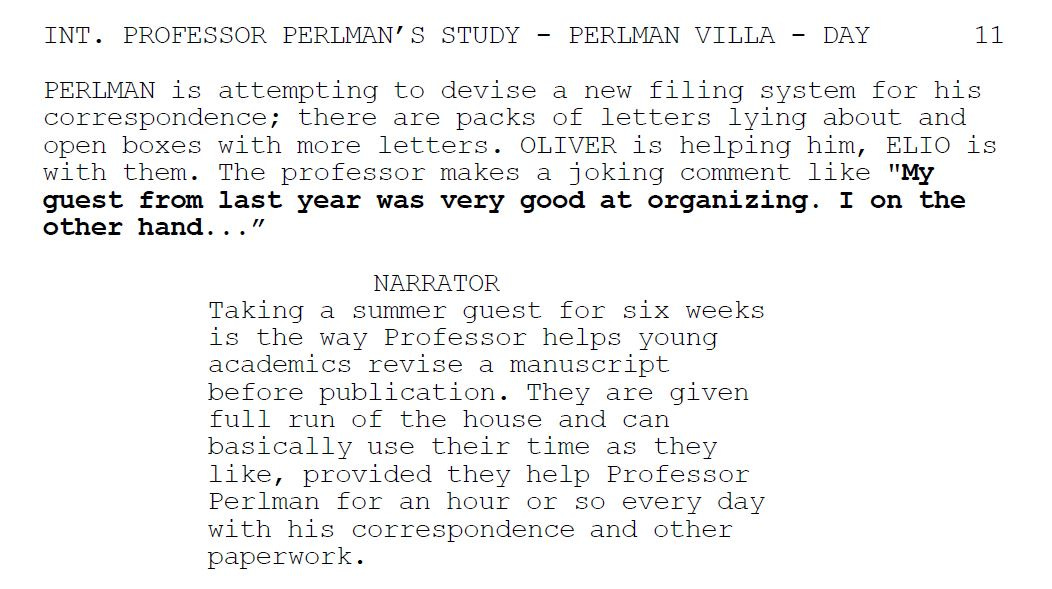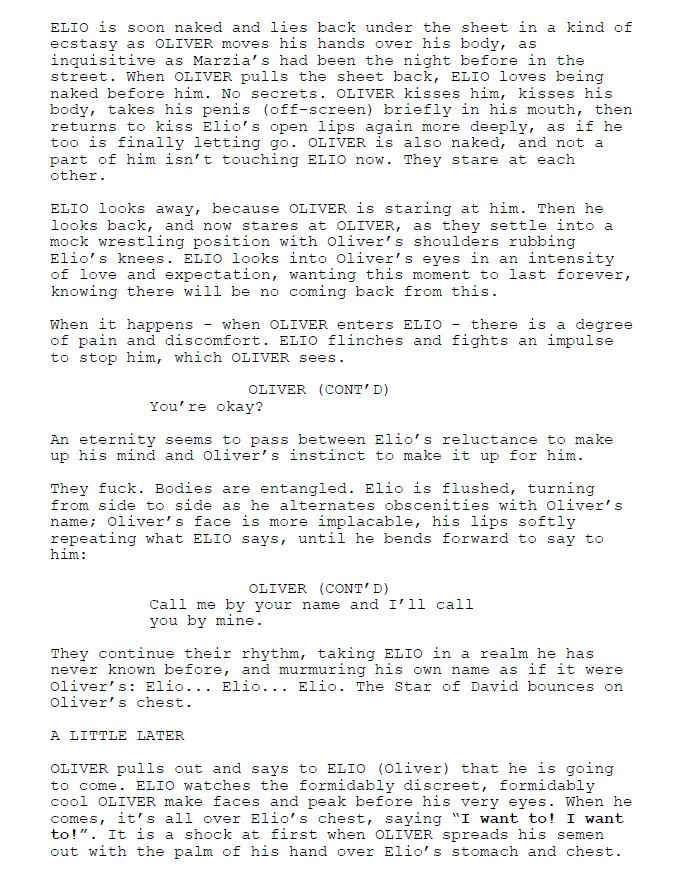Call Me By Your Name (2017) Script Review | #79 WGA 101 Greatest Scripts of the 21st Century
Beautiful, haunting, and powerful, this adaptation of André Aciman's novel will destroy you in this tale about star-crossed lovers that is anything but rote.
Logline: In 1980s Italy, romance blossoms between a seventeen-year-old student and the older man hired as his father's research assistant..
Written by: James Ivory
Based on: Call Me By Your Name by André Aciman
Pages: 94
Number of scenes: 145
Let me get this out of the way: I’ve not read André Aciman’s novel on which the screenplay is based on; but I have read James Ivory’s screenplay and may I say that it is a truly rare beast: an intelligent coming-of-age story that is daring and vulnerable, sensual and tactile, driven by the power of its visuals than its dialogue, and at least half the dialogue being spoken in either Italian or French. There is nothing artificial about this depiction of a discreet romance that blossoms one summer in 1980s Lombardy between young Elio and the older handsome Oliver. The story flows in such an organic manner that at some point I gave up trying to deduce its structure and simply went with it. If there is a structure, I assure you that it is well hidden.
Seventeen-year-old Elio Perlman is forced to give up his room to Oliver, the doctoral student hired by his father, Professor Perlman; the distinguished man generously helps students out with their dissertations in exchange for the students assisting him in his work. Ivory wastes no time in introducing Oliver, bringing him into the story immediately within the opening pages… and then spends the first half of the screenplay slowly ratcheting the tension, like a guitar string being wound tighter and tighter, until page 37, when Elio confesses his feelings, gets shot down, then still has the first kiss (which could be considered the script’s midpoint).
Which raises a question: How do you sustain tension thereafter without it feeling forced?
A cliched approach would be to drive a contrived wedge between Elio and Oliver, purely for the sake of keeping them apart in a series of misunderstandings, before they reconcile in a flurry of confessed feelings. This is the feel-good approach.
Call Me By Your Name is not only atypical, it has no interest in being a feel-good story! Instead, it inserts a (sort of) love triangle involving a young Italian girl called Marzia, to whom Elio loses his virginity. Meanwhile, Marzia’s sister, Chiara, is attracted to Oliver; and Oliver himself seems ambivalent after the first kiss. And then there’s the entire illicit nature of the romance that could have repercussions if it came to light, so there’s plenty of tension sustained here. Will Marzia and the sister find out? There are moments when it seems Marzia suspects Elio’s sexuality.
But Ivory takes care not to depict the sisters, Marzia in particular, in a bad light in order to make Oliver a more appealing choice; Marzia, unfortunately, is a tragic casualty in Elio’s struggles with his own sexuality. The scene on page 80 where Marzia realizes that she has lost Elio makes you feel as wretched as he does; he feels bad, even though where his sexuality is concerned, it’s entirely not within his control to choose who he is attracted to.
And since the two lovers aren’t split up under artificial circumstances, they get to enjoy a trip together before Oliver’s return to America… and it’s only on page 92 that Oliver drops the biggest bombshell over a long-distance phone call: he’s getting married.
Conflict can take other forms, too. Take, for instance, the scene on page 6, when Oliver corrects Professor Perlman over the linguistic origins of the apricot’s name…
… or Oliver sharply shutting down Elio when the latter tries to paint Chiara in a flattering light…
Even the infamous peach scene generates its own conflict over whether or not Oliver will eat it (for the record, I’m ambivalent whether the peach scene is romantic or disgusting— but then, lust tends to be disgusting when viewed in a sober light). In this screenplay, the intelligence of characters is a weapon to wield for conflict— Elio uses his musical talents to express, taunt, and shield his feelings about Oliver on page 10.
And look back at the example on page 80— language is similarly exercised to end things with Marzia— up until then, they had always spoken either in French or Italian, but now he is responding in English, as if signaling that the connection is broken. Subtle, but effective.
By eschewing conventionality, the screenplay has a heightened experience. Not everything is explained or clear-cut— if Elio was attracted to Oliver, why did Elio have sex with Marzia? (Answer: Because teenagers especially don’t always know what they’re doing). Moreover, the script is left open for the director to interpret, to the point where it really does feel like a blueprint than an invigorating read. Take the scene on pages 23-24 where Oliver dances to ‘Love My Way’ by the Psychedelic Furs, then compare it to the scene as it was filmed.
The script doesn’t capture the sensuality, the longing, and the beauty of the scene, because some things cannot be captured on the page. Every line, like any good script, serves a function, but observe how it toes a fine line between action and prose. Astonishing!
It’s also lean— leaner than most screenplays, at 94 pages— because Ivory omits any of the perfunctory dialogue that is unconnected to key developments in the story. He’ll leave notes instructing the performers on what to do— such as introductions on page 2— instead of writing down what to say.
Thanks to its brevity, single lines can be stretched out into extended moments while others can be condensed into brief snippets.
One big difference between the script and finished film is the former has a narrator. I can see why the film excised it— it’s jarring, and it punctures the mood, making it the perfect example for why you should not use voice overs in your script unless it’s absolutely important (or you’re Quentin Tarantino).
It also removes an explicit sex scene between Oliver and Elio on page 70. Why? Search me.
Call Me By Your Name distinguishes itself as a LGBTQ+ positive screenplay owing to the relationship between two male characters. But even behind the scenes, both openly gay director Luca Guadagnino and screenwriter James Ivory helped to make the production more authentic. Ivory, a distinguished filmmaker in his own right during the heyday of Merchant Ivory Productions, had previously earned three Oscar nominations for directing; Call Me By Your Name would be the one to cinch him his first Oscar for Best Adapted Screenplay, which also made him the oldest winner of all time.
Who is James Ivory?
James Ivory (born on June 7, 1928) is an American film director, producer, and screenwriter. He is best known for his long and successful collaboration with producer Ismail Merchant and screenwriter Ruth Prawer Jhabvala, the three pillars of Merchant Ivory Productions, whose films have won seven Academy Awards.
Ivory made his directorial debut in 1963 with the film "The Householder," which marked the beginning of a long and prolific career. In 1985, he earned critical acclaim for his adaption of E.M. Forster's novel, A Room with a View, that earned him his first Best Director Oscar nomination (and gave the world Helena Bonham Carter). These led to other successes including Howards End (1992) and The Remains of the Day (1993), both of which received critical acclaim and multiple Academy Award nominations, including for Best Director for Ivory.
Throughout the years, Ivory has directed several films, including literary adaptations, period dramas, and contemporary stories. The term ‘Merchant Ivory’ entered the cinema lexicon for being a particular brand of film than the actual company, typified often as a period piece set in the early 20th century, using in Edwardian England, lavish sets, famous British actors (or those who’d become famous British actors) playing genteel characters suffering from tragic entanglements and disillusions. Roger Ebert famously described them as “high-end films with low-end budgets, which gave them freedom from studio interference, and they often began with novels by such as Henry James and E.M. Forster that had the advantage of being out of copyright.”
What is James Ivory’s writing process?
Ivory’s process for adapting other people’s work offers useful lessons for other screenwriters who want to adapt somebody’s else material. For starters, Ivory emphasizes that the writer MUST be interested in the source material (here, the novel) and be true to what the author was attempting to say. That, however, does not mean you have to be slavishly devoted to the text. Moreover, budgetary concerns forced Ivory to make changes, adding scenes such as the discovery of the statue in the lake on page 29, while removing anything that would be expensive (later, Guadagnino would trim or remove scenes, such as a beach scene, to save costs).
Once Ivory knows what he wants to write, he sits down with the novel and begins a first draft— in longhand! He’ll pore over the story, scene by scene, and only after he’s satisfied, he’ll type it up on a typewriter (you, the modern screenwriter, who probably wouldn’t be able to find a typewriter even if you wanted to anymore, can use Final Draft or any other screenwriting software). Writing longhand creates an intimacy between you and the material that can sometimes feel absent when typing it on a screen. Try it and see for yourself.
Remember how I mentioned that the screenplay has little dialogue? It turns out that this was deliberate in order to fit in a lot of dialogue— courtesy of a moving and beautiful monologue by Professor Perlman to his son— in the climax. Ivory knew that there was a real danger in putting off the audience with a lengthy monologue just as they are winding down, but he also wanted to preserve the dialogue which was lifted from the novel. To get away with it, he ensured that the preceding scenes— the entire screenplay, if you will— had as little dialogue as possible. Read the scene below in question and tell me it wasn’t worth it.
Call Me By Your Name has a maturity in depicting a romance that is not sanitized by prudish mores; it’s a story in which sexuality and sex is frank in all its loveliness and messiness. The only ick factor is the age gap between Elio and Oliver, though Ivory does have a valid point that other movies get away with the age difference between heterosexual characters (though the ‘what-about-ism’ is not exactly a reassuring defense).
But in spite of this one gray area, it really is a beautiful screenplay. One that is free from convention and unpredictable in its trajectory. It’s a challenge to writers and filmmakers around the world on how to write better romantic stories for cinema. Just maybe keep the age gap in legal territory, though.
Notes:
McKittrick, Christopher (May 15, 2017) James Ivory on Screenwriting | Creative Screenwriting
Roxborough, Scott (January 19, 2018) James Ivory on His Film Legacy and Adapting ‘Call Me by Your Name’ | The Hollywood Reporter




